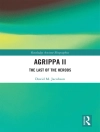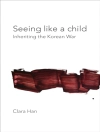Since the end of World War II, the ongoing efforts aimed at criminal prosecution, restitution, and other forms of justice in the wake of the Holocaust have constituted one of the most significant episodes in the history of human rights and international law. As such, they have attracted sustained attention from historians and legal scholars. This edited collection substantially enlarges the topical and disciplinary scope of this burgeoning field, exploring such varied subjects as literary analysis of Hannah Arendt’s work, the restitution case for Gustav Klimt’s Beethoven Frieze, and the ritualistic aspects of criminal trials.
Innehållsförteckning
Figures
Acknowledgments
Abbreviations
A Note on Editing
Introduction
Norman J.W. Goda
PART I: LITERARY AND RELIGIOUS APPROACHES TO HOLOCAUST JUSTICE
Chapter 1. Before the Law: The Poetics of Justice in Hannah Arendt’s Eichmann in Jerusalem
Eric Kligerman
Chapter 2. Criminal Trials as Rituals of Purification
Katharina von Kellenbach
PART II: TESTIMONY AND NARRATIVE
Chapter 3. What Kind of Narrative is Legal Testimony? Terezín Witnesses Before of Czechoslovak, Austrian, and German Courts
Anna Hájková
Chapter 4.
A Morality of Evil:
Nazi Ethics and the Defense Strategies of German Perpetrators
Kerstin von Lingen
PART III: APPROACHES TO JUSTICE IN THE KILLING FIELDS
Chapter 5. The “Second Wave” of Soviet Justice: The 1960s War Crimes Trials
Alexander V. Prusin
Chapter 6. “Not quite Klaus Barbie, but in that Category” Mykola Lebed, the CIA, and the Airbrushing of the Past
Per Anders Rudling
Chapter 7. Convicting the Cog: The Munich Trial of John Demjanjuk
Lawrence Douglas
PART IV: RETHINKING APPROACHES TO HOLOCAUST RESTITUTION
Chapter 8. Reparations, Victims, and Trauma in the Wake of the Holocaust
Regula Ludi
Chapter 9. Achieving a Measure of Justice and Writing Holocaust History through US Restitution Litigation
Michael J. Bazyler
Chapter 10. The Fortunate Possessor: The Case of Gustav Klimt’s Beethoven Frieze
Sophie Lillie
PART V: RETURNING TO NUREMBERG
Chapter 11. Judging from Without: German Clergy, Public Pressure, and Postwar Justice
Jon David K. Wyneken
Chapter 12. Rough Justice and the US Approach to War Crimes Prosecution: Dachau, Guantanamo Bay, and the Nuremberg Exception
Tomaz Jardim
Index
Om författaren
Norman J. W. Goda is the Norman and Irma Braman Professor of Holocaust Studies at the University of Florida. His books include The Holocaust: Europe, the World, and the Jews 1918-1945 (2013), Tales from Spandau: Nazi Criminals and the Cold War (2007), and the edited volume Jewish Histories of the Holocaust: New Transnational Approaches (2014).












